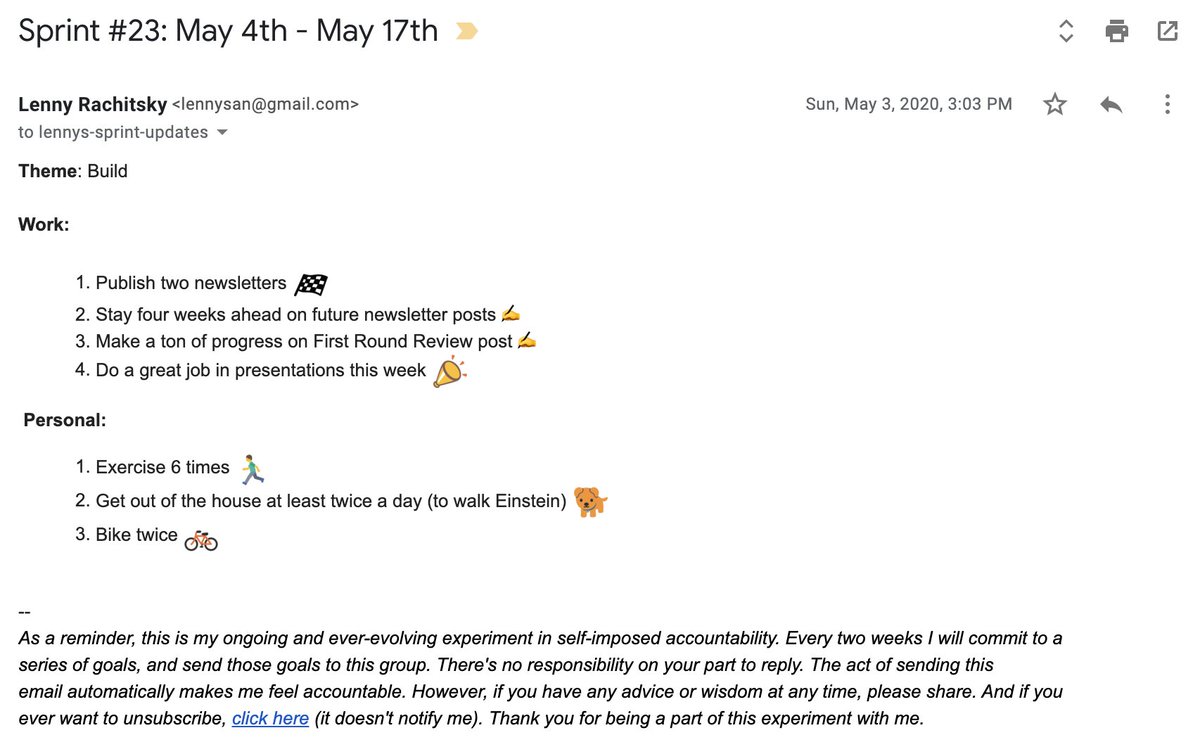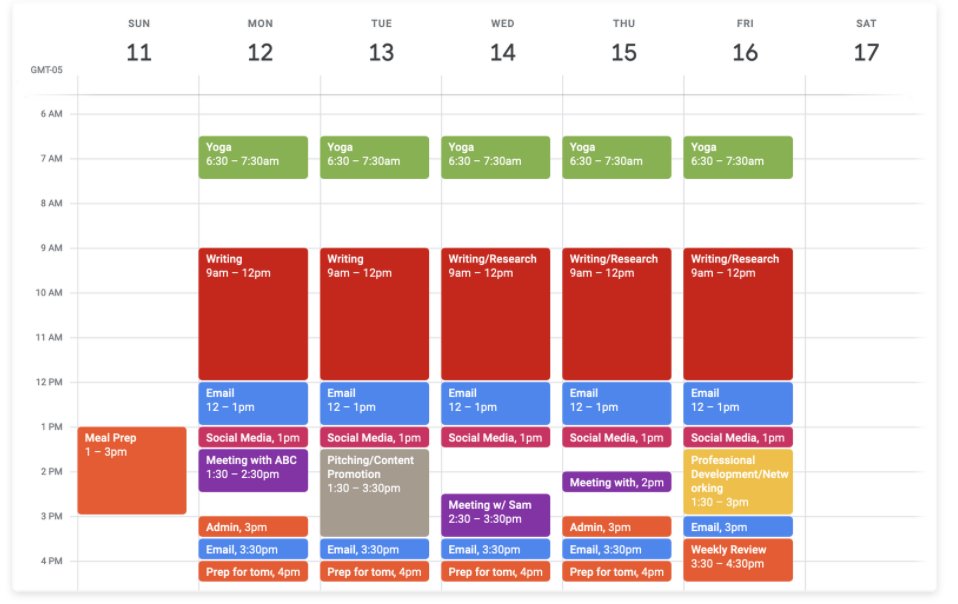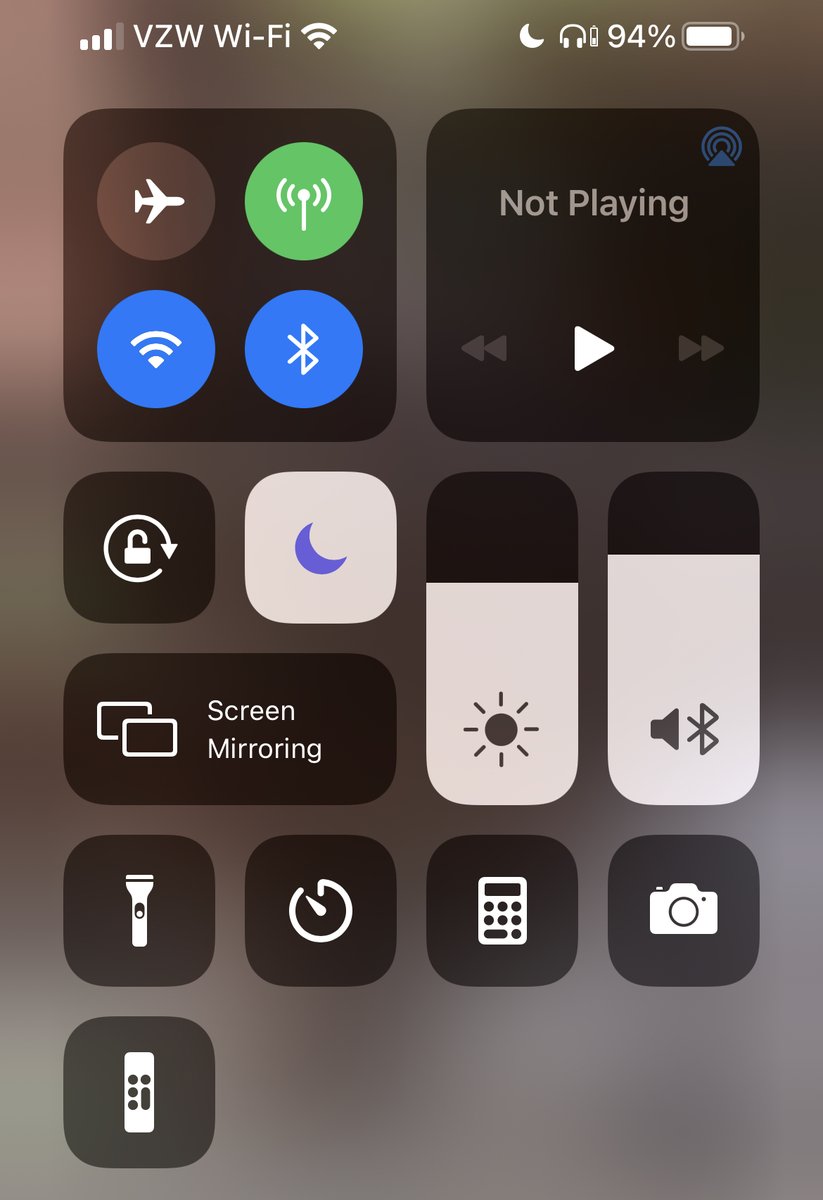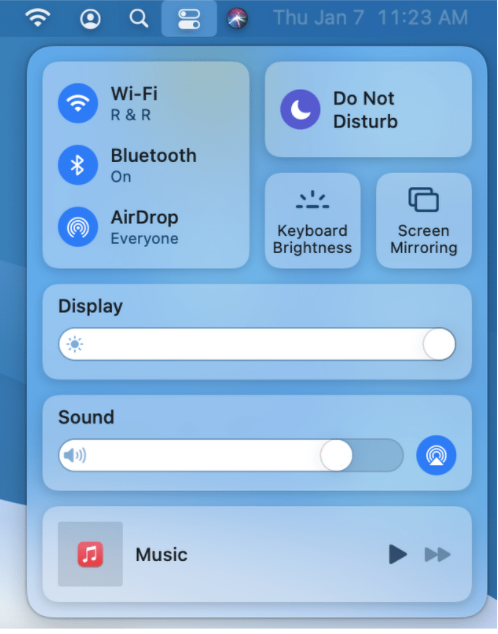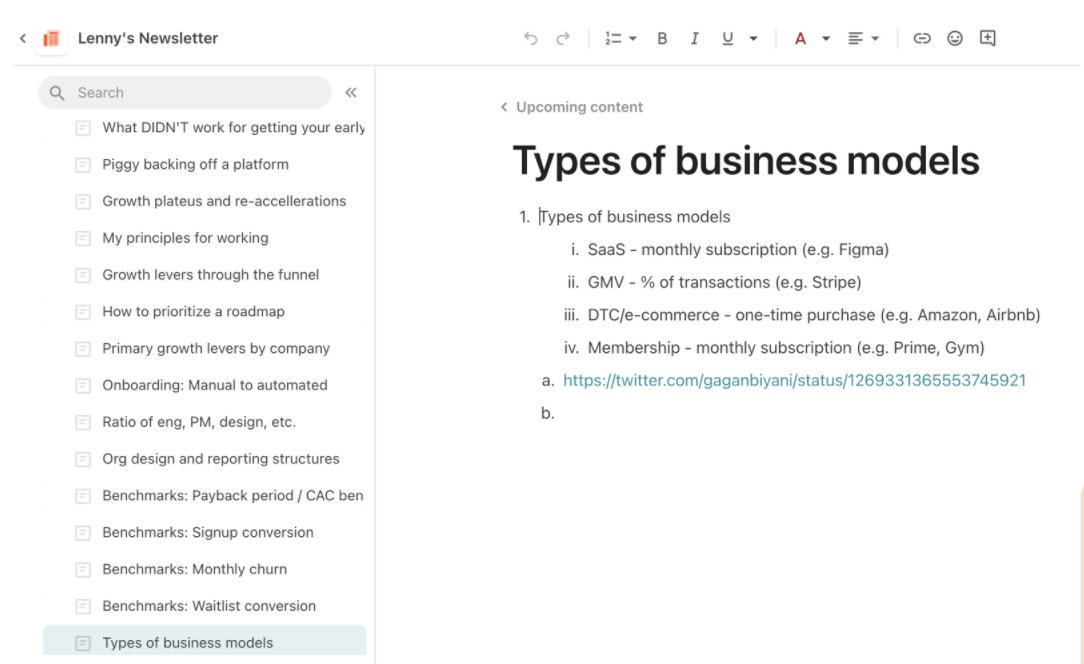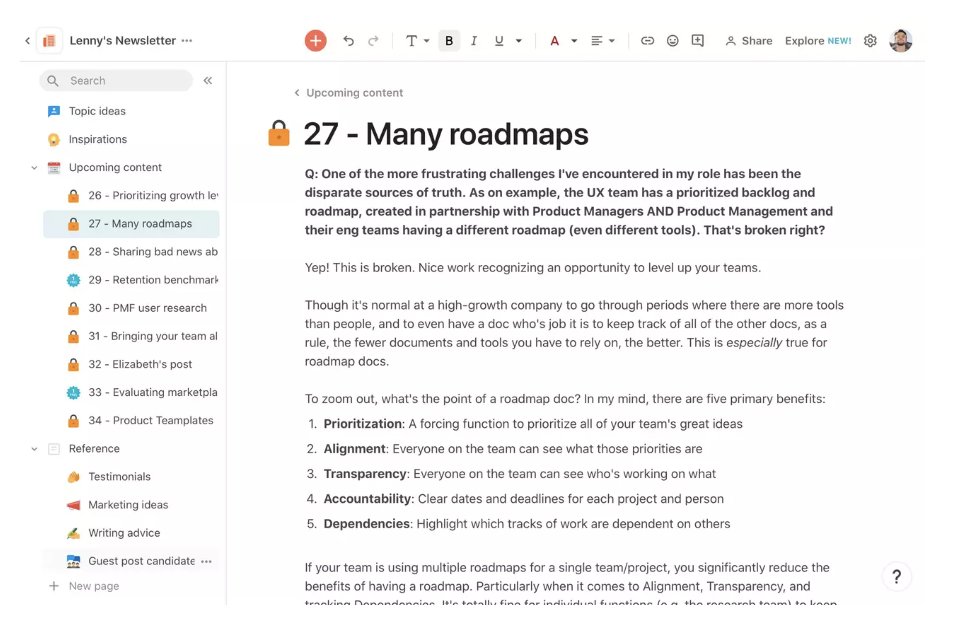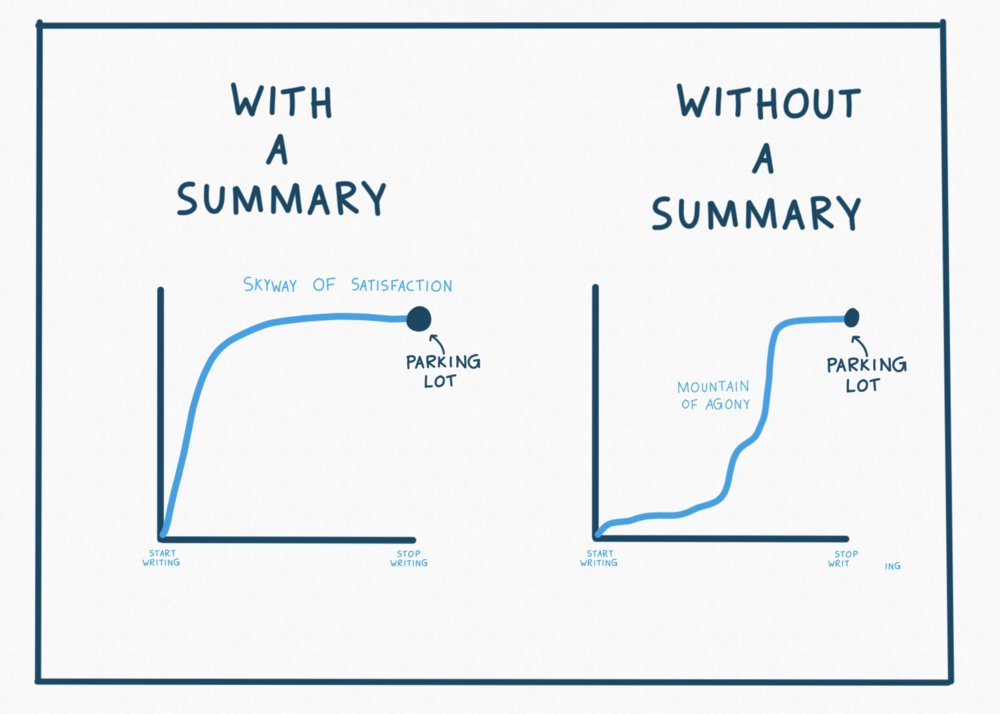Earlier today, I gave a talk at the @SubstackInc's writer conference about building a writing habit. Below are the ten concrete strategies I shared that have helped me publish a post every week for 1.5 years 

0/ First of all, just sharing advice about this topic gives me serious impostor syndrome because writing is still pretty new to me, and I have much to learn. But these are things that have helped me, and I hope they'll help you.
1/ Strategy 1: Commit publicly
This was maybe 50% of my initial motivation. Having told people I was going to write weekly made me feel bad when even thinking about skipping a week. It gave me just enough nudge to keep going. https://twitter.com/lennysan/status/1172237713711542273
This was maybe 50% of my initial motivation. Having told people I was going to write weekly made me feel bad when even thinking about skipping a week. It gave me just enough nudge to keep going. https://twitter.com/lennysan/status/1172237713711542273
1b/ You don't need to make this super public. Just sending an email to a few friends regularly with your concrete goals about writing (and anything else) works wonders.
1c/ If you *really* want to be motivated, ask people for money. Nothing motivates you more than people paying you for regular content. https://twitter.com/lennysan/status/1247520550177476610
2/ Strategy #2: Stay close to what interests you
Writing is hard enough. Write about things that you're genuinely energized by, excited to learn more about, or curious about. Don't force yourself to write things you think you *should* or *need* to write about.
It won't last.
Writing is hard enough. Write about things that you're genuinely energized by, excited to learn more about, or curious about. Don't force yourself to write things you think you *should* or *need* to write about.
It won't last.
2b/ On that, the classic advice is to find a tiny niche and become the best person in that niche. I ignored this advice. I didn't want to spend all of my time thinking about *just* PM, or just growth, etc. I stayed broad so that I'd stay interested in the topic(s).
3/ Strategy #3: Maintain a sustainable pace
Here's what your pace should feel like, IMHO. Writing a newsletter is a marathon. Don't burn yourself out. I personally love the weekly cadence. Daily newsletters blow my mind.
Here's what your pace should feel like, IMHO. Writing a newsletter is a marathon. Don't burn yourself out. I personally love the weekly cadence. Daily newsletters blow my mind.
3b/ Important: People don't want MORE emails. They want better, more valuable, emails.
Consistency + quality = you win.
Consistency + quality = you win.
4/ Strategy #4: Protect deep work time
Valuable, interesting, creative work always comes from focused, distraction-free time. But the world is always trying to take this time away from you. You need to find strategies to protect this time. Read this book. https://www.amazon.com/dp/B013UWFM52/ref=dp-kindle-redirect?_encoding=UTF8&btkr=1
Valuable, interesting, creative work always comes from focused, distraction-free time. But the world is always trying to take this time away from you. You need to find strategies to protect this time. Read this book. https://www.amazon.com/dp/B013UWFM52/ref=dp-kindle-redirect?_encoding=UTF8&btkr=1
4b/ If you don't have a full-time job, my advice is to avoid booking any meetings until 3pm. Try it. It's game-changing.
If you do have a job, can you add 3-hour blocks of time the mornings of M/W/F? Or on a weekend?
If you do have a job, can you add 3-hour blocks of time the mornings of M/W/F? Or on a weekend?
4c/ The #1 highest-grossing Substack writer does it part-time, every day, and makes over $1m. It's possible. https://www.nytimes.com/2020/12/27/business/media/heather-cox-richardson-substack-boston-college.html
5/ Strategy #5: Turn on do-not-disturb mode on both your phone and computer
We have puny brains with no ability to avoid distractions. Embrace "ignorance is bliss." Shut off notifications by turning on DND.
At a minimum, do this during your deep work time. Ideally, all day.
We have puny brains with no ability to avoid distractions. Embrace "ignorance is bliss." Shut off notifications by turning on DND.
At a minimum, do this during your deep work time. Ideally, all day.
6/ Strategy #6: Find tools that help you stay focused, organized, and distraction free
1. A TODO app to prioritize your tasks (I use @centered_app)
2. A doc tool to organize your content (I use @coda_hq)
3. A note-taking tool for quick notes (I use http://mem.ai )
1. A TODO app to prioritize your tasks (I use @centered_app)
2. A doc tool to organize your content (I use @coda_hq)
3. A note-taking tool for quick notes (I use http://mem.ai )
6b/
4. Tools to help you with writing (I use @Grammarly and https://www.powerthesaurus.org/ )
5. Nutrients to boost energy and focus (I drink tea and @magicmind)
6. A platform for hosting/sending content (I use @SubstackInc)
4. Tools to help you with writing (I use @Grammarly and https://www.powerthesaurus.org/ )
5. Nutrients to boost energy and focus (I drink tea and @magicmind)
6. A platform for hosting/sending content (I use @SubstackInc)
7/ Strategy #7: Have an idea dumping ground
When you have time to write, you want to avoid the blank page as much as possible. What helps me is having a place to dump random idea as they come, which I can build and add to over time. I use Coda pages for this.
When you have time to write, you want to avoid the blank page as much as possible. What helps me is having a place to dump random idea as they come, which I can build and add to over time. I use Coda pages for this.
8/ Strategy #8: Turn this idea backlog into a prioritized list of your upcoming content
Give your brain a chance to marinate on what's coming up next, and let go of the things that are way out in the future. And once it's fleshed out enough, throw it into your email system.
Give your brain a chance to marinate on what's coming up next, and let go of the things that are way out in the future. And once it's fleshed out enough, throw it into your email system.
9/ Strategy #9: Go where the energy takes you
Give yourself permission to change course on your next topic if you aren't feeling it. Go where your energy takes you.
You don't owe anyone anything (usually). More excited about something else? Roll with it! It'll be better also.
Give yourself permission to change course on your next topic if you aren't feeling it. Go where your energy takes you.
You don't owe anyone anything (usually). More excited about something else? Roll with it! It'll be better also.
9b/ Avoid this feeling as much as you can. Chase your energy.
10/ Strategy #10: Create a summary when you stop writing
I learned this from @david_perell. When you're about to step away, add a note to the top about what comes next in the piece, and what you're thinking at the time. Help your future self ramp-up fast. https://perell.com/note/leave-a-summary-for-yourself/
I learned this from @david_perell. When you're about to step away, add a note to the top about what comes next in the piece, and what you're thinking at the time. Help your future self ramp-up fast. https://perell.com/note/leave-a-summary-for-yourself/
11/ Here's the full deck if you want more https://www.canva.com/design/DAESBO5RCnw/IIvHNNbmQxFrIBn-dQx4Jw/view?utm_content=DAESBO5RCnw&utm_campaign=designshare&utm_medium=link&utm_source=sharebutton
12/ Strategy #11: Don’t overthink your tools, platforms, systems. Just write.
Focus 90% of your time on creating amazing content. Any time you spend on things like the perfect platform, growth hacks, website, etc. is rarely worth it. Especially early on. It’ll distract you.
Focus 90% of your time on creating amazing content. Any time you spend on things like the perfect platform, growth hacks, website, etc. is rarely worth it. Especially early on. It’ll distract you.

 Read on Twitter
Read on Twitter